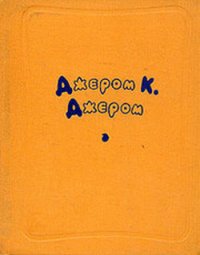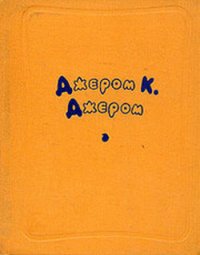My First Book - Jerome Jerome Klapka (читать книги онлайн полностью без регистрации .TXT) 📗
And now to wind up; if I have made a name, if I have made a career, as it seems I have, I have only one piece of pride connected with it. Not pride in my work, for no one with a grain of sense or modesty would, in these days, dare to consider his or her literary efforts of much worth, as compared with what has already been done by the past great authors. My pride is simply this: that I have fought my fight alone, and that I have no thanks to offer to anyone, save those legitimately due to the publisher who launched my first book, but who, it must be remembered, would, as a good business man, have unquestionably published nothing else of mine had I been a failure. I count no 'friend on the Press,' and I owe no 'distinguished critic' any debt of gratitude. I have come, by happy chance, straight into close and sympathetic union with my public, and attained to independence and good fortune while still young and able to enjoy both. An 'incomprehensibly successful' novelist I was called last summer by an irritated correspondent of Life, who chanced to see me sharing in the full flow of pleasure and social amusement during the 'season' at Homburg. Well, if it be so, this 'incomprehensible success' has been attained, I rejoice to say, without either 'log-roller' or 'boom,' and were I of the old Greek faith, I should pour a libation to the gods for giving me this victory. Certainly I used to hope for what Britishers aptly call 'fair play' from the critics, but I have ceased to expect that now. It is evidently a delight to them to abuse me, else they would not go out of their way to do it; and I have no wish to interfere with either their 'copy' or their fun. The public are beyond them altogether. And Literature is like that famous hill told of in the 'Arabian Nights,' where threatening anonymous voices shouted the most deadly insults and injuries to anyone who attempted to climb it. If the adventurer turned back to listen, he was instantly changed into stone; but if he pressed boldly on, he reached the summit and found magic talismans. Now I am only at the commencement of the journey, and am ascending the hill with a light heart and in good humour. I hear the taunting voices on all sides, but I do not stop to listen, nor have I once turned back. My eyes are fixed on the distant peak of the mountain, and my mind is set on arriving there if possible. My ambition may be too great, and I may never arrive. That is a matter for the fates to settle. But, in the meanwhile, I enjoy climbing. I have nothing to grumble about. I consider Literature the noblest Art in the world, and have no complaint whatever to urge against it as a profession. Its rewards, whether great or small, are sufficient for me, inasmuch as I love my work, and love makes all things easy.

Note.—Since writing the above I have been asked to state whether, in my arrangements for publishing, I employ a 'literary agent' or use a 'type-writer.' I do not. With regard to the first part of the query, I consider that authors, like other people, should learn how to manage their own affairs themselves, and that when they take a paid agent into their confidence, they make open confession of their business incapacity, and voluntarily elect to remain in foolish ignorance of the practical part of their profession. Secondly, I dislike type-writing, and prefer to make my own MS. distinctly legible. It takes no more time to write clearly than in spidery hieroglyphics, and a slovenly scribble is no proof of cleverness, but rather of carelessness and a tendency to 'scamp' work.
'ON THE STAGE AND OFF'
By Jerome K. Jerome

THE story of one's 'first book' I take to be the last chapter of one's literary romance. The long wooing is over. The ardent young author has at last won his coy public. The good publisher has joined their hands. The merry critics, invited to the feast of reason, have blessed the union, and thrown the rice and slippers—occasionally other things. The bridegroom sits alone with his bride, none between them, and ponders.
The fierce struggle, with its wild hopes and fears, its heart-leapings and heart-achings, its rose-pink dawns of endless promise, its grey twilights of despair, its passion and its pain, lies behind. Before him stretches the long, level road of daily doing. Will he please her to all time? Will she always be sweet and gracious to him? Will she never tire of him? The echo of the wedding-bells floats faintly through the darkening room. The fair forms of half-forgotten dreams rise up around him. He springs to his feet with a slight shiver, and rings for the lamps to be lighted.
Ah! that 'first book' we meant to write! How it pressed forward an oriflamme of joy, through all ranks and peoples; how the world rang with the wonder of it! How men and women laughed and cried over it! From every page there leaped to light a new idea. Its every paragraph scintillated with fresh wit, deep thought, and new humour. And, ye gods! how the critics praised it! How they rejoiced over the discovery of the new genius! How ably they pointed out to the reading public its manifold merits, its marvellous charm! Aye, it was a great work, that book we wrote as we strode laughing through the silent streets, beneath the little stars.

And, heigho! what a poor little thing it was, the book that we did write! I draw him from his shelf (he is of a faint pink colour, as though blushing all over for his sins), and stand him up before me on the desk. 'Jerome K. Jerome'—the K very big, followed by a small J, so that in many quarters the author is spoken of as 'Jerome Kjerome,' a name that in certain smoke-laden circles still clings to me—'On the Stage—and Off: The Brief Career of a would-be Actor. One Shilling.'
I suppose I ought to be ashamed of him, but how can I be? Is he not my first-born? Did he not come to me in the days of weariness, making my heart glad and proud? Do I not love him the more for his shortcomings?
Somehow, as I stare at him in this dim candlelight, he seems to take odd shape. Slowly he grows into a little pink imp, sitting cross-legged among the litter of my books and papers, squinting at me (I think the squint is caused by the big 'K'), and I find myself chatting with him.
It is an interesting conversation to me, for it is entirely about myself, and I do nearly all the talking, he merely throwing in an occasional necessary reply, or recalling to my memory a forgotten name or face.
We chat of the little room in Whitfield Street, off the Tottenham Court Road, where he was born; of our depressing, meek-eyed old landlady, and of how, one day, during the course of chance talk, it came out that she, in the far back days of her youth, had been an actress, winning stage love and breaking stage hearts with the best of them; of how the faded face would light up as, standing with the tea-tray in her hands, she would tell us of her triumphs, and repeat to us her 'Press Notices,' which she had learned by heart; and of how from her we heard not a few facts and stories useful to us. We talk of the footsteps that of evenings would climb the creaking stairs and enter at our door; of George, who always believed in us (God bless him!), though he could never explain why; of practical Charley, who thought we should do better if we left literature alone and stuck to work. Ah! well, he meant kindly, and there be many who would that he had prevailed. We remember the difficulties we had to contend with; the couple in the room below, who would come in and go to bed at twelve, and lie there, quarrelling loudly, until sleep overcame them about two, driving our tender and philosophical sentences entirely out of our head; of the asthmatical old law-writer, whose never-ceasing cough troubled us greatly (maybe, it troubled him also, but I fear we did not consider that); of the rickety table that wobbled as we wrote, and that, whenever in a forgetful moment we leant upon it, gently but firmly collapsed.




